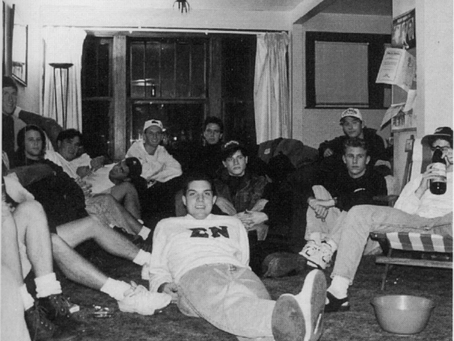Editor’s note: This story is originally housed by The Delta of Sigma Nu website.
Research Proves the Value of Fraternities
We all know the positive impact Sigma Nu has had on our lives. From lifelong friendships to professional preparedness and from developing us as leaders to fostering a mindset for service, the Fraternity helped make us who we are today.
Knox Sigma Nu 1994-95
We know that. But recent research on fraternities has actually proven the impact Sigma Nu and other men’s fraternities have on men in college and throughout their lives.
Research proves that fraternities foster positive mental health, serve as an accelerator for success, and engender tremendous loyalty and connection to their campus, community, and brothers.
Here are three key takeaways from a collection of independent studies on fraternities.
Fraternity members experience stronger mental health and wellness.
While college men are experiencing loneliness and depression at increasing rates, fraternities empower students to create a strong support system.
Research shows that this connection can create a strong sense of belonging, leading members to have more positive mental health and less anxiety and depression than other students. (5) Brothers feel comfortable having tough conversations and learning from each other, and when they seek help, members are twice as likely to reach out to a fraternity brother than anyone else. (1)
“Since being dubbed a Knight, my quality of life has seen a huge increase. I never thought the feeling I would have would be so deep. I have held two executive office positions since my initiation, and I have learned so much about leadership and overall success.” – Luke Edwards (North Carolina State)
Fraternities are an accelerator for success in college and beyond.
Students spend 90% of their time outside the classroom. Fraternities capitalize on those hours by preparing men for success in college and in their futures far beyond what their peers experience. A study of thousands of alumni of diverse backgrounds shows this holds true regardless of an individual’s background or socioeconomic status entering college.
Because of higher expectations and the support and network fraternities provide, members experience greater gains in learning and graduate at higher rates than their peers. 83% of members say their confidence in their leadership skills increased because of their membership. (1) Fraternity members also report higher levels of interaction with people different from themselves, making them more prepared than their peers to join a diverse workforce and community. (2)
“Sigma Nu’s extensive LEAD Program and expectations for success have helped me build my professional resume and network with alumni.” – Graham Avers (Colorado State)
Fraternities create lifelong connections to the campus, community, and peers.
Fraternity men love their collegiate experience – as students and as alumni. In fact, more than 8 out of 10 fraternity members say they would rejoin their organizations. (4) Research shows fraternity membership connects men to the university in a way that nonmembers simply don’t experience. (1) They’re more satisfied as students and as alumni are more likely to recommend and give back to their alma maters. (4)
Members are more engaged inside and outside the classroom than their peers—they report feeling more supported by their faculty, and nearly half serve in leadership roles across campus. (2) They’re also more connected to their local communities, with research showing they spend significantly more time volunteering than non-affiliated students. (3)
“As a first generation Mexican American, I never had a vision of what and who I wanted to be. Sigma Nu gave me responsibility, not just for myself but for my community. Giving back is what pushes our sense of purpose. Inspiring the new classes to lead when I leave is my end goal.” – Sam Carranza (Cal State LA)
2021 Knox Sigma Nu Strip
Call out stats:
Studies prove fraternity men are:
-
3x more likely to obtain an internship while in college
-
Almost 2x as likely to have a job waiting for them when they graduate
-
2x as likely to encourage others to attend their alma mater
-
5x as likely to give back financially to their alma mater
-
Almost 5x as likely to be satisfied with their lives as alums
Cited research, provided courtesy of NIC (North American Interfraternity Conference):
-
Fraternities & Values of Single-Sex Experience, UT-PERC
-
The Greek Experience Revisited: The Relationships between Fraternity/Sorority Membership and Student Engagement, Learning Outcomes, Grades, and Satisfaction with College; Pike
-
Perspectives on Fraternity and Sorority Life; Positive Youth Development, EverFi
-
Fraternities and Sororities: Experiences and Outcomes in College, Work, and Life; Gallup 2021
-
Mental Health and Wellness for Fraternity and Sorority Members; Biddix, Assalone, and Grace


